Editor’s Note: What follows is a digital companion to a George Allen contribution to the August 2018 MHInsider print magazine (page 53-55) that encourages established manufactured housing industry professionals to write their career and life stories so they may be compiled into a memoir or autobiography.
This contribution was thoughtfully provided by Allen, given the summer print edition coverage of and distribution at the RV/MH Hall of Fame 2018 induction ceremonies in Elkhart, Ind.
In addition to serving as a hall, museum and event space for the two industries, the on-site library houses original copies of industry publications, and sells many of them. Below, Allen provides expanded descriptions and explanations of each of the books mentioned in his magazine column.
Now to meet the manufactured housing industry authors, one at a time and in detail, from the perspective of George Allen
Kristian Jensen – ‘A Danish American’
I never met Kristian Jensen, Sr., but I’ve read and reread his slim volume, “A Danish American”. On one hand, its published crude, with no front material – beginning Chapter 1 on the first page – and no page numbers thereafter. On the other hand, it’s a most engaging read, much in the manner that he penned this 1996 letter to me:
“The purpose of the book is to encourage poor young men to go for it. I was poor, uneducated, but built a corporation worth over 60 million dollars, was President and Chairman of the Board for 42 years. Others can do the same with will-to-do, and hard thinking. (When) I see (someone) do the same, I have been amply rewarded.
“We moved into one of our parks in late 1963. A man in our industry said, ‘I thought Jensen knew better.’ I replied, ‘If a park is not good enough for the owner to live in, then it is not good enough.’ My wife and I are still living, happy and peacefully, in a factory-built home in a new converted park section, a garden grove for factory-built homes.”
Unfortunately, “A Danish American” has been out of print for more than a decade, and to the best of my knowledge, there are no plans to update and reprint this fine work.
Kristian Jensen, Sr., was succeeded in the manufactured housing business by his son Kristian Jensen, Jr., who, in turn, was inducted into the RV/MH Hall of Fame in 2009, a few years before his passing. Jensen Communities, headquartered in Connecticut, today is run by Kristian Jensen, III.
Here’s one of the most compelling paragraphs in “A Danish American”. It says a lot about the man, Kristian Jensen, Sr.
“When I started the business, I prayed to God to give me wisdom to do right to all people who gave me work. I never prayed for riches or success. I prayed for clear and good thinking or wisdom, to understand and be obedient to all laws. Always, God gave me good direction. He was always there to help when needed. I had no other place to go, when thinking about plans and construction of mobile home parks from 1948 to 1950, (as) there were no schools to teach it.”
And such is the tenor throughout Kris Jensen, Sr.’s. autobiography. I hope the Jensen family, someday, reproduces their patriarch’s autobiography. In my opinion, it’s a must-read for men and women coming into the manufactured housing industry and land-lease community asset class today!
John Crean – ‘The Wheel & I’ and ‘My Life Driving Fleetwood Enterprises to the Top’
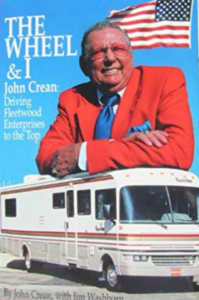
John Crean, founder of Fleetwood Enterprises, was a celebrity when I came into the manufactured housing and community business in 1978. But I never really got to know the man, until I read “The Wheel & I”, subtitled: “My Life Driving Fleetwood Enterprises to the Top”. A reader doesn’t have to look beyond the Forward to catch the flavor of John Crean. Here’s how his longtime friend Stan Freberg describes him…
“He is eccentric, ultra-conservative, ultra-kindhearted, ultra-rich, and a Freberg fan — qualities I… look for in a friend.”
And this, “His book traces his quirky life from (being) a World War II Merchant Marine, to hand-crafting a better Venetian blind for house trailers in his father-in-law’s garage, which led to his hand-building his first trailer – and creating Fleetwood Enterprises….”
Advice is not in short supply in “The Wheel & I”. How ’bout this gem on achieving business success:
“A piece of advice I’d suggest to anyone, is to learn your business on someone else’s dime. If you want to make widgets, go to work for a widget company. Do well and work cheap, and you’ll get promoted. As long as you learn how to make all the widgets, how to sell them, where to buy the material and everything else, then you can go off and take a crack at it yourself.”
And Crean shares many other business insights as he, with the help of co-author Jim Washburn, work their way through his life, e.g. “In display ads and photographs of our homes, we always used tiny women to model, to make the homes look larger.” p.214.
Then there’s this offering:
“It is always amazing to me to see the ways businesses find to throw money away. Instead of hiring consulting groups and commissioning endless studies, why not just get out there in the world and see what works? I got most of my ideas for what our product should be by traveling around the country talking to people who own Fleetwoods, and experiencing the product firsthand.”
As one might expect, Crean’s opinion of his successor Glenn Kummer (also an RV/MH Hall of Famer, circa 1996) is terse: “Thanks to Glenn’s shenanigans, I sold off my remaining Fleetwood shares when I was ousted, and am sitting on a boodle of money instead of a bunch of sinking Fleetwood stock.”
James Clayton – ‘First a Dream’
Anyone in the manufactured housing industry today knows, or knows of, James Clayton, the self-made Tennessee millionaire, some say billionaire, who sold Clayton Homes. Today, run by his son Kevin, Clayton is owned by Berkshire Hathaway company, and his 65-plus manufactured home communities are operated by YES! Communities, headquartered in Colorado.
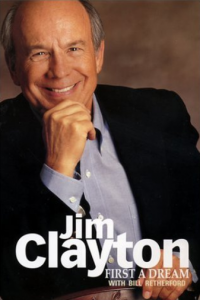
My guess is Jim’s book has been read by more manufactured housing aficionados than all nine others together. Why? Because, it’s the only tome to go through two editions in short order, in 2003 and 2004. That’s no surprise, as Jim actively promoted the 514 page text at trade shows, industry meetings, everywhere – always announcing 100 percent of book-sale proceeds would go to the RV/MH Hall of Fame museum and library in Elkhart.
And, is this ever a tale to enjoy! Here’s from the review I penned, after reading the first edition in 2003: “The substance of ‘First A Dream’ is broadly based on Jim Clayton’s early life as a sharecropper’s son, student, fledgling pilot, radio show personality, country singer (At the Grand Ol’ Opry, no less!), young entrepreneur; and ultimately, successful businessman and banker. The book highlights four categories of personal insight and sageness:
- His general, personal and business lessons learned, tips and principles
- Pithy insights relative to marketing and sales “the Clayton way”
- Insider manufactured housing revelations, unavailable anywhere else
- CMH-specific concepts and programs worthy of emulation
Here’s what Jim has to say about salespeople: “I believe introverts, those with a quieter, more thoughtful approach, sell more than extroverts do. Introverts listen better.” Heard of the acronym TEAM, and how it generally means: ‘Together Everyone Achieves More!’? Well, in Jim’s world it means: ‘Together Everyone Accomplishes More!’ The difference? There is one, but you’ll have to ask him.
Closing here, with an anecdotal personal story relative to this book. In my initial review, I criticized Jim for taking former employees to task, especially one who “… had been embezzling money to the tune of $3.8 million over eight years.” These personal revenge tales, in my opinion, interrupted the flow of his remarkable life story, prompting one to question his view on forgiveness. When Jim asked permission to include the review in the appendix of the second edition, I happily gave it – learning later, the new volume came out, sans the troublesome critique paragraph. Oh well…
Bottom line? As I summarized in the review, “Everyone who earns a paycheck, or receives a dividend check, from any HUD-Code manufactured housing-related business interest should study this book!”
Boris Vukovich – ‘Vukovich Photo-Autobiography’
I met Boris Vukovich one time, over lunch, when visiting his family’s firm, Colorado Real Estate Investments, now Ascencia Real Estate Holding Company. And what a memorable experience that was, as he shared the exciting tale of how he, and later his wife to-be Natasha emigrated from Serbia following their marriage by proxy. That story is well told in the photo-autobiography prepared by his sons, upon his passing a few years ago. And yes, the family firm is well into its third generation.
Darrel and Harrel Cohron – ‘The Trailer Twins’
I’ve known the Cohron twins since I started in the manufactured housing business in 1978. Identical twins Darrel and Harrel were singled out to me then, along with local community developer Bud Meyer, to be worthy mentors for anyone new and passionate about the manufactured housing and community business. And that they were, though in a quiet, unassuming manner. That is, except for Darrel, who’s the only one of the three mentors still living.
One day, back in the early 1980s, I asked Darrel, during lunch, about the wisdom of my buying a nearly empty 500-plus site manufactured home community my firm was managing in foreclosure. He could have easily stole the deal from me, but didn’t.
Rather, he simply confirmed the accuracy of my value estimate, and challenged me. “George, there comes a time in every businessman’s life when he has to decide whether to stay on the porch, or go out and run with the big dogs. I think this is that time in your life.” Well, my business partners and I acquired the property from the bank for $400,000 cash; and two years later, after doubling its physical and economic occupancy, sold it for five times that much, again in cash.
And that’s how business life was with the Cohron twins. No question about it, they were self-made, very wealthy businessmen in the manufactured housing arena. According to the 29th annual ALLEN REPORT in 2018, they own/operate in excess of 1,400 rental homesites in central Indiana, as well as a very active independent MH retail sales center on the northeast side of Indianapolis.
“The Trailer Twins”, as I understand it, was written with the assistance of family member Matt Cohron, who introduces his grandfather Darrel Cohron and great uncle Harrell in the foreword.
“They are amazing men, and anyone who knows them, will tell you a story or two or three our four, about their kindness, their generosity, and their love of pranks. Darrel and Harrel are colorful characters who are a lot of fun to be around. They also taught me a lot about the world of business, and the real world, about how to treat people, and how to take care of one’s family.”
Within the book, the first pearl of wisdom comes from Darrel. “We loved it. We still do. You have to. If you’re not in love with what you do, you’re just not ever gonna make it.”
Then there’s this sales gem from Woody, one of their longtime manufactured housing salesmen: “You always sell yourself first, then the product. Even if you happen to be a little higher priced than your competition, the customer will still buy from you if they like you.”
The Cohron brothers’ “success formula”?
“First, you never lie to a customer; and second, after a sale, you give good customer service, and follow up to make sure that the customer is satisfied.” Works for them; will likely work for you, me, all of us.
There’s more. “That is part of the secret of our success. We don’t keep anything bottled up. That doesn’t do anybody any good. Speak your mind and move on. We have been successful in business because we trust our guts and we trust each other.”
I still count Darrel as a special friend in the manufactured housing and community business. I especially like his personal bromide: “Our motto is get up early, stay late, (&) tell the truth.”
Mike Conlon – ‘Unconventional Wealth’
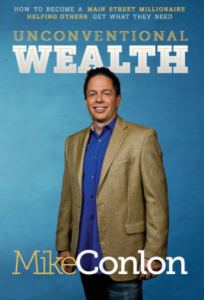
Unlike the other autobiographers, Mike Conlon is what I’ve come to identify as a “young wealth builder”, and at times, “a Young Lion” when he and other property portfolio builders outstrip everyone else acquiring/consolidating land lease communities.
Now, some of his experience and advice is too good not to share. Chapter 6 states “Don’t Ever Give Your Money to an African Businessman… a Condo Developer… a Thumper… Your Uncle… or a Timeshare Salesman.” This he underscores with the following quote:
“I’ll never forget sitting down in late 2008 to talk with a mid-level money manager from Louisiana, about an investment he made in a mobile home community Ponzi scheme. I was trying to buy one of the communities tied up in that scam, and was trying to find out what had happened with the investors. Seven investors lost over $3 million on this one community, and over 200 investors lost almost $75 million total amongst 20 or so communities.”
And how about this opinion of the world of wealth and opportunity today:
“The 55-plus generation has bankrupted the country and has no interest in having their taxes raised or taking one penny less in Social Security and Medicare, than they are currently entitled to receive. The wealth gap between the average household headed by a 65 year old and that of the household headed by the average 35 year old is the widest in U.S. history and has increased by five times since 2005!” So beware, those of you (us) who’re more than 65 years of age!
So, where are manufactured housing and communities in all this?
“Most M$M businesses aren’t pretty, but they make lots of money and their potential customer base continues to grow. I’m a prime example – a guy with a law degree making a lot of money in the mobile home park business. I wish I had ‘gone ugly’ a lot sooner in my career.”
Ouch! But at least he’s being honest in sharing his opinions about our industry. Guess the question that weighs and will continue to weigh on my mind is, if Mike hangs around until he’s in his 60s, and adds to his autobiography, will he continue to hold the same views, or wax more moderate?
Occasionally, as was the case with the Cohron twins, special attention should be paid to aggressive assertions, especially those going to print. No specifics on either, but let’s just say in Conlon’s case – when one quotes a particular real estate valuation formula, be sure to get it right before sending the manuscript to be printed and bound, for the whole world to see!
As much as I enjoyed reading Mike’s story, I look forward even more to the next chapter in his life. And I’ll tell you about it when I read it.
George Goldman – ‘The Road Less Traveled’
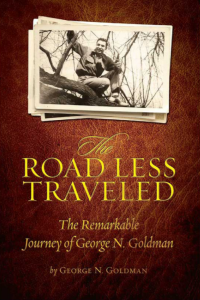
George Goldman was another longtime mobile home park owner/operator I considered, at times, a mentor. At other times, I wasn’t so sure. He was a smart operator, shrewd, and a risk taker; more so than my tolerance could bear.
Anyway, George owned income-producing communities in Illinois, Indiana, Wisconsin and Texas, and also, for awhile, had ownership in Woodall Publishing Company, distributing the largest directories of U.S. RV and mobile home parks.
Unlike any of the other autobiographies described here, George took me down memory lane, as he mentioned individuals, time and again I’d know in the MHBusiness. These include Dean Shively, Elmer Harrison, Merv Duckett, as well as personal friend David Alley, a civil engineer who with Ed Hicks and me co-authored “Development, Marketing & Operation of Manufactured Home Communities”, published by J. Wiley & Sons in 1994.
Here are three take-away quotes gleaned from “The Road Less Traveled”:
- “If you are clever – and patient – you can always find a way.”
- Advice from his Mother: “To always care for other people” and “If I did the right thing, everything else would ultimately work out just fine.”
- “Never fall in love with a property.” Amen to that truism!
We’ve all heard tales of why Woodall’s mobile home park directory went under after 1976; here it’s documented:
“Then the Woodall ‘reps’ took off their inspector hats, donned their sales hats, and pitched some of the advertising opportunities to the park’s owner. Maintaining objectivity and independence in those two conflicting assignments was a constant challenge.”
George and a business partner taught mobile home park financing, even brokered such properties, before buying his first community: the former Shortridge Village in Indianapolis in 1971, then Long Acre MHCommunity in 1972.
The last third of George’s autobiography details his and wife Judy’s battles with serious health issues. To this end, they established a charitable foundation that endures to this day. This is a good example of ensuring one’s legacy lives on in the minds and memories of family members, friends, and those benefiting from the trust and foundation.
Al Schrader – ‘A Path to Million$’
Ah, one of my favorite stories to tell. Al Schrader and I have been friends for decades. Since he’s in Minnesota and I’m in Indiana, we don’t see each other often. But I was present at the RV/MH Hall of Fame in 2004 when he was inducted into that prestigious protector of MH & RV legacies. And I believe he was present during my induction in 2011.
What’s to like about Al’s autobiography? It’s comprised of 100 short stories in 100 chapters! And his stories touch on every part of his life as a youngster, college student, military veteran, family man, getting started in business, and his enduring love of Cadillac convertibles…
But the pithiest of Al’s writings have to do with the manufactured housing industry and communities, and where he sees them today. In fact, if some of this reads familiar, it’s likely because he’s been oft-quoted in MH trade publications
Here is Schrader in his own words:
“My main concern regarding the industry is the lack of overall growth on a national basis. Back in the early ’70s, manufactured homes represented one out of every four new homes built in this country. That ratio slid to an all-time low of one out of every 20 new homes. And even greater danger has been the lack of a positive image in the eye of the American public. How many times are the downtrodden, hard luck, poverty stricken, low lifes shown on TV and screen living in an old rusty trailer in a bad trailer park?
“We can’t seem to get away from this image, which is shared by the general public, but is far from the truth and represented by over 15 million people who actually live in a manufactured home. The lack of development of new, modern manufactured home communities is a main reason for this image problem, in part caused by increasingly prohibitive zoning laws fostered in the 1960s and 1990s.
“I truly think the industry is, in many ways, its own worst enemy. Many of the old crowd like to keep things the way they are, and resist change in every way. The lack of an industry wide image campaign is a prime example. Other trade groups have promoted their product with national television campaigns, and have changed images and promoted growth and sales. It takes big money, but it also takes great leadership.
“We’re an industry that provides quality housing for low income Americans, and have never taken any form of subsidy from the Federal government.
“Further, there are no Government-sponsored loan programs to help finance manufactured homes in land lease communities. Compare that with all other forms of government-favored housing, and you can quickly see why this industry has had growth issues.”
And that’s Al’s blunt and insightful take on manufactured housing and communities today. If you have an opportunity, read the rest of his autobiography.
George Allen – ‘SWAN SONG’
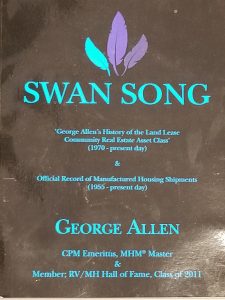
George Allen’s “SWAN SONG” is a semi-autobiographical work that also traces the history of land-lease communities from 1970 to present day, and serves as official record of manufactured housing annual shipment volumes from 1955 to present day. And yes, the title implies this 15th authored or edited book is one of the last from this pen
The book is replete with personal tales: “An Error to Die For…” is a true story of an errant NOI miscalculation that resulted in multiple deaths; “Lantern Hills Village” details going from $400K to $2.5 million in value in two years; there’s the predatory finance classic “Upside Down in a Mobile Home Park”; “The Florida Communities Story”; and “One Man’s Vision Realized!” is the true, never-before published story of beautiful Saddlebrook Farms in Grayslake, Ill. There’s even the poem, “A Toast to the Community Owner”!
The first edition of this book sold out in six months. A new desk reference second edition, now available, adds the 29th annual ALLEN REPORT; new Official Definition of Affordable Housing; a new Chapter 6: “History of ROC USA”; new risk management guidelines and the “MHFinance Retrospective”, a history of monetary cycles dating to 1950 prepared for the Federal Housing Finance Agency’s “Listening Sessions” during 2017.
To purchase a copy of this new edition of SWAN SONG, phone the Official MHIndustry HOTLINE: (877) MFD-HSNG or 633-4764 or RV/MH Hall of Fame.
Sam Zell – ‘Am I being Too Subtle?’
Who, in the manufactured housing industry and the land lease community realty asset class doesn’t know and respect Samuel Zell, chairman of the largest portfolio of such properties in the world. His recent Penguin Random House published autobiography, “Am I Being Too Subtle?” is the closest thing we have to a page turner among all 10 such books available to date. The suggestive subtitle “Straight Talk From a Business Rebel” sets the stage for what follows:
- “In this book I share the story of how a restless curious boy who grew up in Chicago made it to the Forbes 400.”
- “You could say I’m an investor, or an allocator of capital. But what I really am is an entrepreneur.”
- “Some of my most lucrative investments seemed counterintuitive… manufactured home communities.”
- “…learned a lasting business lesson: Where there is scarcity, price is no object.”
- “…indifference to rejection is a fundamental part of being an entrepreneur.”
- “Howard Walker…once said he felt like he was walking into the inside of a Juicy Fruit wrapper when he visited (our offices),” he wrote. “We invented business casual.”
- “This has always been a fatal flaw in U.S. real estate: the volume of development has been related to the availability of funds, not to demand.”
- “…a lot of people who get burned by depending on Wall Street analysts … discover quickly the advice they’re getting isn’t coming from a committed owner – it’s coming from a professional who is collecting a fee.”
In the final pages of the book, Sam takes time to identify nine key business philosophies. And he states his desired legacy: “He made a difference.”
There’s so much more to the book, but you surely get the idea. Want a copy? Simply go to Amazon and order one.













